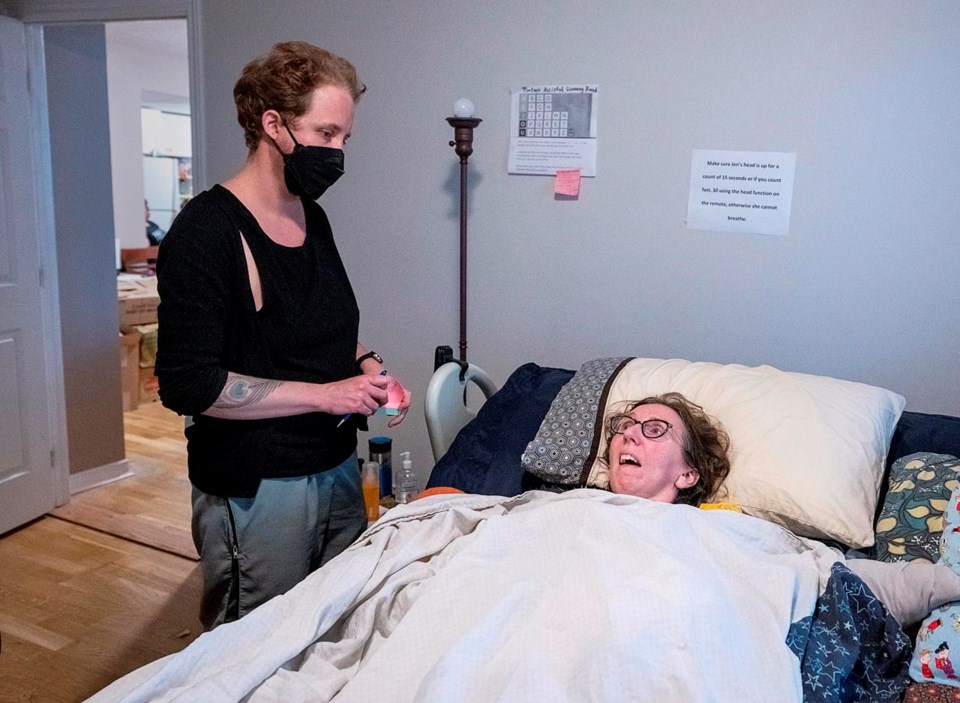HALIFAX ÔÇö Jen Powley, who pushed back with her writing and wisdom against systems that limited the lives of Nova Scotians with disabilities, has died at the age of 45.
Carrie Ernst, director of Independent Living Nova Scotia, confirmed Monday that Powley died in hospital on Sunday evening due to complications from her advanced multiple sclerosis. 
Ernst recalled joining forces with Powley in recent years on a pilot project that demonstrated how, with appropriate assistance, people with severe disabilities could live independently in homes tailored to their own lives and desires. 
Powley used her own apartment as a model, inviting a disabled roommate to join her and creating a funding model that allowed for round-the-clock care.
In her most recent book, "Making a Home," Powley described how she created the project because she wanted to show how people with severe disabilities did not need to be placed in nursing homes in a "medicalized model."
ÔÇťIndependent living is about having choices, making decisions, taking risks, making mistakes and taking responsibility for your decisions,ÔÇŁ Powley wrote.
She filled her books with anecdotes about the joys of keeping greater control of your life, even as a degenerative disease diminished physical capacities. And she raged against a system that leaned toward what she referred to as "warehousing."
Throughout the book, she made clear that a person needs to live in a home of their own making, even with its imperfections.
In its introduction, she recalled her visit to a nursing home when she was 36, writing, ÔÇťThough it is meant to be a home, it does not smell like a home ÔÇö either in a good way or a bad way. Maybe it was the hour at which I arrived, but it smelled neither like freshly baked cookies nor like mouldy damp towels. It smelled like nothing except cleaning chemicals."
The book was a sequel to her 2017 autobiography, ÔÇťJust Jen,ÔÇŁ where she also wrote of her fears of losing her independence, saying, "The thought of institutional care invaded my dreams."
Ernst said in an interview that she worked with Powley to create a funding model for the province to set up the apartment as an alternative, and its success has helped prompt the province to shift about 200 young people out of care homes into more independent lives.
Powley's views on independence included the right for people with severe disabilities to pursue ÔÇťinformed risk," including exploring their sexual lives. She wrote in ÔÇťMaking a Home,ÔÇŁ that ÔÇťSex should not only be tolerated, but encouraged.ÔÇŁ
Her sense of fun was infectious, those who worked with her recall.
Farzan Hedayat, who was Powley's assistant, says he never saw her as being in a wheelchair without use of her arms or legs, but rather as being like a "gazelle," a word she had tattooed on her wrist.
He said in an interview that he will remember Powley as a woman who "always pushed beyond the limitations," with searing intelligence and charisma.
"The gazelle grew wings and has flown away to her eternal destination," he said.
He said her books, which he helped with, "were about her own life ... but also a bigger perspective, a bigger picture. Her last book is her legacy."
Ernst said she expects to miss her friend and colleague tremendously. "When I was with her, I sometimes tripped into the (wheelchair,) bumped into the chair because I just didn't see the chair, I just saw her. I was more focused on the conversation and the interaction," she said.
In her final book, Powley spoke of this social connection as the key to independent living and the pathway to overcoming the institutional model.
"The medicalization of disability got society into a certain mindset, which is hard to break. Thus, changing the system is slow and almost impossible, but it can be done," she wrote. "It takes courage and a lot of patience."
This report by The Canadian Press was first published Sept. 18, 2023.
Michael Tutton, The Canadian Press




